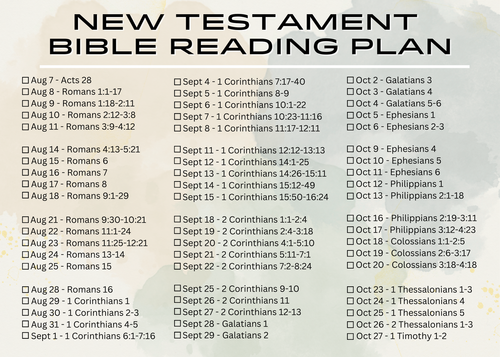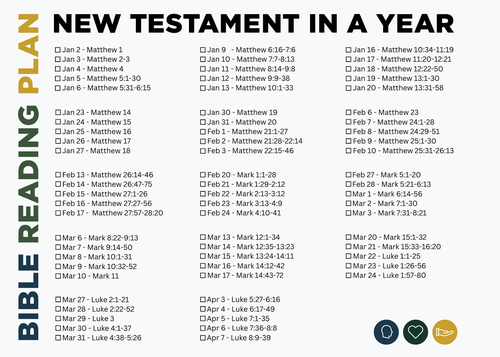Jars Of Clay
2 Corinthians 4:1-5:10
Paul understands that the ministry, granted solely by divine mercy, should not be intimidated by the enormity of the task. We bring nothing of our own to the ministry; its productivity and potency rely entirely on God. He alone bestows and sustains it. Manipulating or distorting this clear message would be contradictory.
In verse 3:14, Paul mentions the hardening of unbelievers' minds, but now he refers to their minds being blinded. The old era persists with Satan as its ruler (see Eph. 2:2), while the new era has arrived. Christ's glory surpasses the Mosaic age's glory because it is based on "the gospel," the good news. Through Christ's accomplishments, sinners can be restored. The last Adam, the true "image of God," triumphs where Adam, the first person created in God's image, failed. Genuine gospel ministers emphasize Christ, not themselves, promoting themselves only as servants. Instead of shining on our faces, divine light illuminates our hearts. Unlike Moses, believers today have the privilege of experiencing God's presence in the flesh through His Son. We witness God's glory in the person of Jesus Christ, allowing us to gain a profound understanding of Him.
This significant ministry, through which God opens the eyes of sinners blinded by the Devil and initiates a new creation, resides in fragile vessels. The jar appears visibly vulnerable, but inside, it holds an indomitable treasure of immeasurable value and invincible power. Even if the jar is broken, the gospel spills out for the world to witness. God entrusts His gospel treasure to clay jars to show that the surpassing power belongs to Him. From general adversity to being utterly defeated, God sustains and reveals His power. Without His intervention, we would crumble emotionally, psychologically, relationally, and physically. Believers carry the essence of Jesus' earthly life, surrendering to the heavenly agenda, expediting their eventual passing. Embodying Jesus' death is not fleeting; physical death will come, but the new life of resurrection will persist. When Christ comes back, we will receive bodies like His.
Paul describes believers as willingly enduring mistreatment from the world while under the loving care of their heavenly Father. One aspect of God's redemptive plan is to use our experiences of suffering and persecution in this temporary life to inspire and encourage others. On the other hand, Unbelievers are spiritually dead, though they may perceive themselves as alive. Believers, in contrast, are spiritually alive, even though they may feel like they are dying because they possess the power of resurrection life. In Psalm 116, the psalmist recounts a harrowing experience of being on the brink of death with no apparent way out. Yet, the Lord came to his rescue and saved him. Although spared from death, he continues to live in this mortal existence, holding onto the hope of future resurrection. This hope is made certain by the resurrection of Christ, guaranteeing our resurrection. Paul marvels at the profound reality of experiencing Christ's resurrection in our lives, both now and in the future, in the presence of Christ himself.
Paul's ministry focuses on the welfare of the Corinthians, extending grace, gratitude of the saved, and glorifying God. He encourages us in the face of challenges, combining realism with hope for stability. Empowered by the Spirit and united with Christ, our inner selves move closer each day to fulfilling their ultimate purpose. What is the purpose of "wasting away"? It is to bring about an eternal weight of glory that surpasses any comparison. The future holds a glory of such high quality that it transcends the greatest glories of this present evil age. Our current afflictions nurture the glory that lies ahead. As we focus on the invisible world, we become attuned to and encouraged by it. We are called to gaze upon the unseen and behold what is beyond physical sight. In other words, we are to fix our heart's eyes on the next world, the coming glory that is invisible to our physical eyes but apprehended by the eyes of faith.
Paul uses the imagery of a "tent" and a "house" to reassure readers about the future resurrection body received when Christ returns and establishes the new heavens and earth. This promise is so certain that Paul confidently says "we have" it, using the present tense. Despite earthly bodies deteriorating, we can be certain of being securely placed in the spiritual eschatological temple, with Jesus as the cornerstone (Eph. 2:19–22).
Paul acknowledges our existence as "jars of clay" (4:7). He mentions our longing for resurrection bodies in the new earth in Romans 8:23. When Paul refers to "our heavenly dwelling," he is not talking about the intermediate state in heaven but the final "heavenly" body we will receive. As believers in Christ, we eagerly anticipate being clothed in the same immortal resurrection body as Christ. This transformation is not merely superficial but comprehensive (1 Cor. 15:54), resulting in a body that still reflects our mortal existence. Paul's main point is that there will be no discomfort or embarrassment when we put on our future resurrection body. Compared to the glorious risen body that awaits us, we are currently "naked" in a sense.
While we may groan carrying our physical bodies, it doesn't mean we desire to be completely body-free. Paul longs for a life free from sin, focusing on eliminating sin, not the body itself. Resurrection life overcomes our weaknesses and mortality. The Holy Spirit within us is evidence of God's initiative, not just a pledge, but the beginning of what's promised. The joy of the new earth is characterized by restored fellowship with God. Through the Holy Spirit, this fellowship has already begun.
Since Christ has ascended to heaven in his spiritual resurrection body, we, his people, are not physically present with him. However, we are united in him, and our daily lives are shaped by eschatology. "Walking by faith" means intentionally living with the understanding that we will share in the resurrection body one day. This life requires courage, and if given the choice, believers would rather be with the resurrected Lord. Thankfully, we don't have to make that choice.
Paul emphasizes that considering the divinely initiated assurance of resurrection life in the presence of the One who sacrificed Himself for us and has been raised to an immortal existence that awaits us, our natural response is to desire to please Him. This desire brings the greatest joy. Moreover, we have a significant reason to pursue pleasing Christ. We will ultimately stand before Him as He judges our entire lives—every aspect, pattern, and habit. God understands our weaknesses and tendency to err. This judgment encompasses our entire lives, yet Paul seems to refer to potential rewards that follow rather than a definitive justifying verdict. Even these rewards are bestowed by God's grace, not our self-generated virtue. Despite occasional appearances, our universe is a realm of absolute and ultimate moral seriousness. Hidden motives will be revealed, justice will prevail, and the oppressed vindicated. We can live in peace, knowing that God will rectify all injustices.
In verse 3:14, Paul mentions the hardening of unbelievers' minds, but now he refers to their minds being blinded. The old era persists with Satan as its ruler (see Eph. 2:2), while the new era has arrived. Christ's glory surpasses the Mosaic age's glory because it is based on "the gospel," the good news. Through Christ's accomplishments, sinners can be restored. The last Adam, the true "image of God," triumphs where Adam, the first person created in God's image, failed. Genuine gospel ministers emphasize Christ, not themselves, promoting themselves only as servants. Instead of shining on our faces, divine light illuminates our hearts. Unlike Moses, believers today have the privilege of experiencing God's presence in the flesh through His Son. We witness God's glory in the person of Jesus Christ, allowing us to gain a profound understanding of Him.
This significant ministry, through which God opens the eyes of sinners blinded by the Devil and initiates a new creation, resides in fragile vessels. The jar appears visibly vulnerable, but inside, it holds an indomitable treasure of immeasurable value and invincible power. Even if the jar is broken, the gospel spills out for the world to witness. God entrusts His gospel treasure to clay jars to show that the surpassing power belongs to Him. From general adversity to being utterly defeated, God sustains and reveals His power. Without His intervention, we would crumble emotionally, psychologically, relationally, and physically. Believers carry the essence of Jesus' earthly life, surrendering to the heavenly agenda, expediting their eventual passing. Embodying Jesus' death is not fleeting; physical death will come, but the new life of resurrection will persist. When Christ comes back, we will receive bodies like His.
Paul describes believers as willingly enduring mistreatment from the world while under the loving care of their heavenly Father. One aspect of God's redemptive plan is to use our experiences of suffering and persecution in this temporary life to inspire and encourage others. On the other hand, Unbelievers are spiritually dead, though they may perceive themselves as alive. Believers, in contrast, are spiritually alive, even though they may feel like they are dying because they possess the power of resurrection life. In Psalm 116, the psalmist recounts a harrowing experience of being on the brink of death with no apparent way out. Yet, the Lord came to his rescue and saved him. Although spared from death, he continues to live in this mortal existence, holding onto the hope of future resurrection. This hope is made certain by the resurrection of Christ, guaranteeing our resurrection. Paul marvels at the profound reality of experiencing Christ's resurrection in our lives, both now and in the future, in the presence of Christ himself.
Paul's ministry focuses on the welfare of the Corinthians, extending grace, gratitude of the saved, and glorifying God. He encourages us in the face of challenges, combining realism with hope for stability. Empowered by the Spirit and united with Christ, our inner selves move closer each day to fulfilling their ultimate purpose. What is the purpose of "wasting away"? It is to bring about an eternal weight of glory that surpasses any comparison. The future holds a glory of such high quality that it transcends the greatest glories of this present evil age. Our current afflictions nurture the glory that lies ahead. As we focus on the invisible world, we become attuned to and encouraged by it. We are called to gaze upon the unseen and behold what is beyond physical sight. In other words, we are to fix our heart's eyes on the next world, the coming glory that is invisible to our physical eyes but apprehended by the eyes of faith.
Paul uses the imagery of a "tent" and a "house" to reassure readers about the future resurrection body received when Christ returns and establishes the new heavens and earth. This promise is so certain that Paul confidently says "we have" it, using the present tense. Despite earthly bodies deteriorating, we can be certain of being securely placed in the spiritual eschatological temple, with Jesus as the cornerstone (Eph. 2:19–22).
Paul acknowledges our existence as "jars of clay" (4:7). He mentions our longing for resurrection bodies in the new earth in Romans 8:23. When Paul refers to "our heavenly dwelling," he is not talking about the intermediate state in heaven but the final "heavenly" body we will receive. As believers in Christ, we eagerly anticipate being clothed in the same immortal resurrection body as Christ. This transformation is not merely superficial but comprehensive (1 Cor. 15:54), resulting in a body that still reflects our mortal existence. Paul's main point is that there will be no discomfort or embarrassment when we put on our future resurrection body. Compared to the glorious risen body that awaits us, we are currently "naked" in a sense.
While we may groan carrying our physical bodies, it doesn't mean we desire to be completely body-free. Paul longs for a life free from sin, focusing on eliminating sin, not the body itself. Resurrection life overcomes our weaknesses and mortality. The Holy Spirit within us is evidence of God's initiative, not just a pledge, but the beginning of what's promised. The joy of the new earth is characterized by restored fellowship with God. Through the Holy Spirit, this fellowship has already begun.
Since Christ has ascended to heaven in his spiritual resurrection body, we, his people, are not physically present with him. However, we are united in him, and our daily lives are shaped by eschatology. "Walking by faith" means intentionally living with the understanding that we will share in the resurrection body one day. This life requires courage, and if given the choice, believers would rather be with the resurrected Lord. Thankfully, we don't have to make that choice.
Paul emphasizes that considering the divinely initiated assurance of resurrection life in the presence of the One who sacrificed Himself for us and has been raised to an immortal existence that awaits us, our natural response is to desire to please Him. This desire brings the greatest joy. Moreover, we have a significant reason to pursue pleasing Christ. We will ultimately stand before Him as He judges our entire lives—every aspect, pattern, and habit. God understands our weaknesses and tendency to err. This judgment encompasses our entire lives, yet Paul seems to refer to potential rewards that follow rather than a definitive justifying verdict. Even these rewards are bestowed by God's grace, not our self-generated virtue. Despite occasional appearances, our universe is a realm of absolute and ultimate moral seriousness. Hidden motives will be revealed, justice will prevail, and the oppressed vindicated. We can live in peace, knowing that God will rectify all injustices.





Recent
Archive
2023
January
Happy New Year!He Will Save His People From Their SinsMy Beloved SonTemptation And MinistryThe SermonLeaving, Lying, Limits, Love, Largesse, and The Lord's PrayerTreasure, Anxiety, and JudgmentAstonishing AuthorityStorms, Demons, and HealingJesus Is CompassionateHis Eye Is On The SparrowSwords, Rewards, and MessengersThe Lord of the SabbathBlasphemy, Bad Trees, Signs, and FamilyStories, Sowers, and SoilsParables, Hidden Treasure, and RejectionFame, Food, Fear, Faith, and FringeReal Issues And The Power Of GodDying To Find LifeLike The SunChildren, Temptation, Sheep, And ForgivenessMarriage, Kids, And MoneyTo Serve And Give His Life
February
The ArrivalStories That StingQuestion TrapsHidden Motives And LamentThe End...?UnexpectedReady?Punishment, The Plot, And PerfumeTreachery, Passover, and The CupBetrayal, Injustice, And DenialThe Field Of Blood And The GovernorCrucifixion And DeathAll AuthorityMark—The Beginning Of The GospelHealing, Preaching, And The Forgiveness Of SinEating With Tax Collectors, Fasting, The Sabbath, And An Escape BoatThe Twelve, Blasphemy, Family, And A ParableParables And PowerA Different Kind Of StormPower Had Gone Out
March
Death, Hunger, And MiraclesCommandment Or TraditionDo You Not Yet Understand?The Christ And A Glimpse Of His GloryUnbelief, Confusion, And SinDivorce, Children, And PossessionsTo Give His Life As A RansomHosannaThe Rejected Stone, Taxes, And The Great CommandmentDestruction And The EndNo One Knows, An Anointing, And A Promise To BetrayPassover And GethsemaneThe Kiss, Arrest, And DenialPilate, Simon, And The CrucifixionDeath, Burial, Resurrection, And What\'s NextTheophilus And A Visit From GabrielMary And The MagnificatBenedictusThe Arrival And The ShepherdsSimeon, Anna, And The SpiritFruits Keeping With Repentance And BaptismThe Wilderness, Nazareth, And CapernaumSimon's Mother-In-Law, Fishing, A Leper, And Sins
April
Tax Collectors, Fasting, Sabbath Controversies, And The TwelveWhy Do You Call Me Lord, Lord?Jesus Marveled, A Raised Son, And QuestionsA Sinful Woman And A ParableObeying The Word, A Storm, And DemonsTwelve Years, Twelve Apostles, And SpeculationGreater, Costly, And GloryNot Getting It, The Cost, And AppointedWoes, Neighbors, And What Is NecessaryHelp Us Pray And A Divided Kingdom?Signs, Lights, And WoesHypocrisy, Fear, A Fool, And AnxietyParables, Division, And The TimesWarnings, A Daughter Of Abraham, And Jerusalem, JerusalemA Son Or An Ox, Parties, And DiscipleshipLost ThingsThe Dishonest Manager, The Law, And Anguish In This FlameMillstones And Mustard SeedsPersistent Prayer, Humility, A Childlike Faith, And The Rich RulerEverything That Is Written, A Blind Beggar, And A Wee Little Man
May
A Parable, A Colt, A Prophecy, And A CleansingAuthority, Wicked Tenants, And TaxesThings To Beware Of And WidowsDestruction, Persecution, The Son Of Man, And WatchingThe Plot, Betrayal, Lord's Supper, And Inappropriate BehaviorPrediction, Fulfillment, Agony, Betrayal, And DenialMistreated, Taken Before The Council, Pilate, Herod, And Delivered To Be CrucifiedCrucifixion, Death, And BurialHe Is Not HereDisbelieved For JoyIn The Beginning…The Lamb Of God And A WeddingZeal, What's Inside, And Born AgainHe Must Increase
Categories
no categories
Tags
no tags
